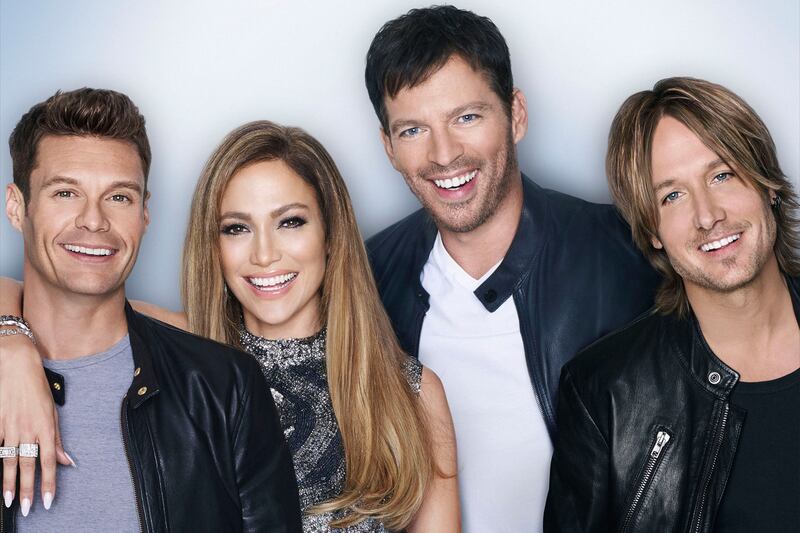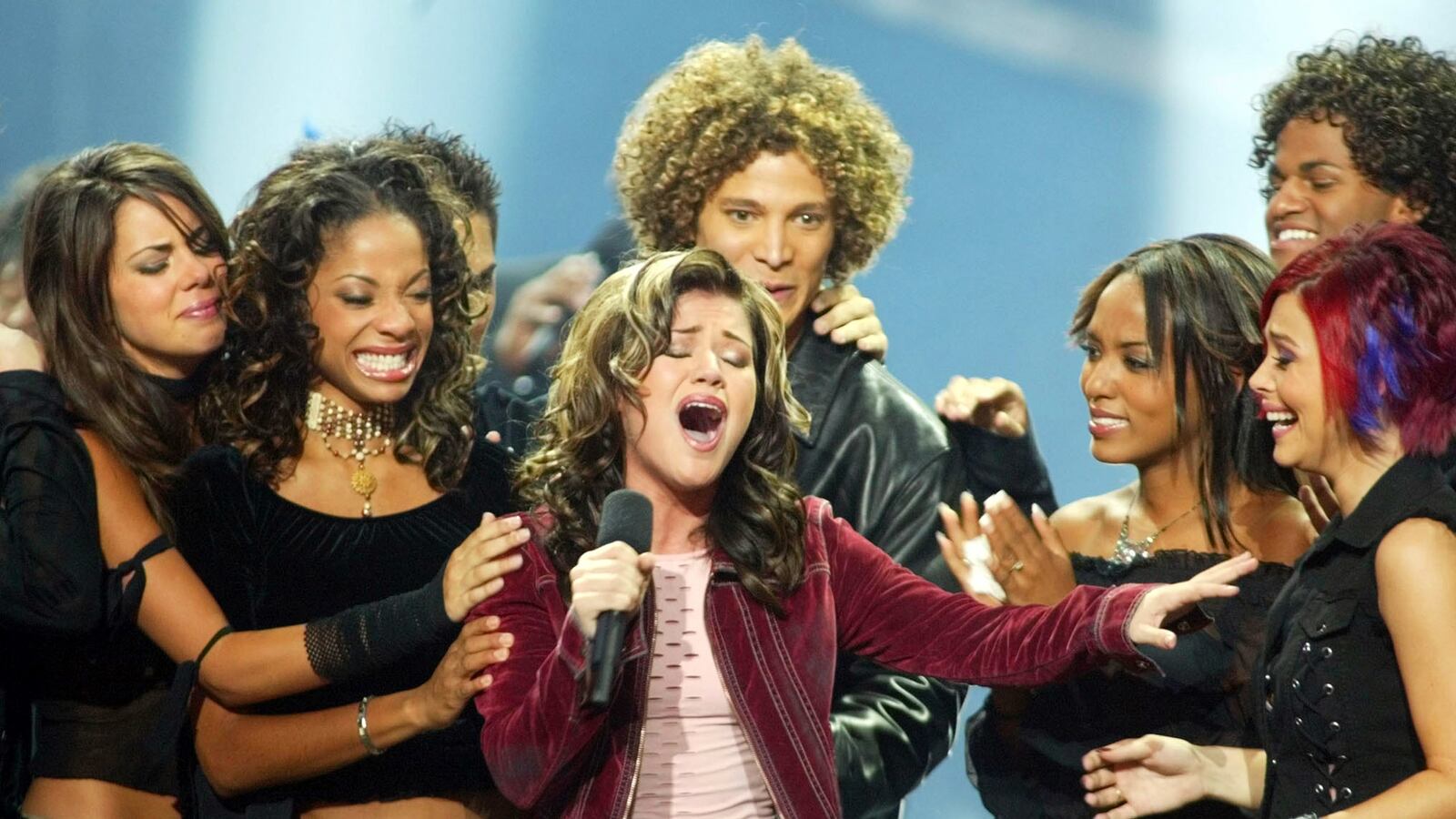In the summer of 2002, a shy Texan girl in an outfit she had made herself entirely out of denim jeans—a joutfit, if you will—walks into an audition room. She tells Paula Abdul that she’s always been a fan of hers, while two music producers most of us have never heard of—one British, one a former session bassist for Journey—look on. She begins singing the most gee-golly adorable version of Madonna’s “Express Yourself” you’ve ever heard.
Kelly Clarkson wasn’t the first person to audition for American Idol, but she was the most important one.
Months later, as confetti rained down on her while she belted a tearful rendition of the treacly ballad “A Moment Like This,” she’d have helped launch a music and television industry phenomenon, and be the example, as that phenomenon’s influence petered to a whisper in ensuing years, of its lasting worth.
Now, after 15 seasons, that phenomenon is coming to a close. Fox announced Monday morning that American Idol’s upcoming 15th season, which will begin airing next to January and bring back host Ryan Seacrest and judges Jennifer Lopez, Keith Urban, and Harry Connick Jr., will be its last.
In some corners of the culture sphere, the reaction to this is a shrugged “good riddance.” Does anyone even watch that show anymore? When was the last time it actually created a superstar? If a karaoke-enthusiast tree falls in a forest that has forgotten it even existed, will anyone hear it?
Allow one of American Idol’s last apologists to explain why the show will always matter.
Idol was never supposed to be as huge as it was. In fact, no one really knew what to expect from it. It was the last to arrive at a time when reality TV blockbusters were born with a boom: Survivor, Big Brother, The Amazing Race, and The Bachelor, all of which are still around, too.
Its audience tripled during that summer airing, from the time Clarkson made her denim-clad debut to her far more polished coronation as the first Idol. Between 2003 and 2010, it typically found itself perched at the top of the Nielsen ratings, regularly averaging between 25 and 30 million viewers, with Fox going so far as to air several episodes of the show each week.
And in that span, music superstars were made. Clarkson, Clay Aiken, Carrie Underwood, Chris Daughtry, Fantasia, Jennifer Hudson, Katharine McPhee, Adam Lambert, and Jordin Sparks might be the A-list of that group.
But even the contestants who never found multi-platinum fame scored Grammy nominations (Ruben Studdard, Mandisa), hit singles (Phillip Phillips, Kris Allen, David Archuleta, David Cook), Broadway fame (Tamyra Gray, Diana DeGarmo), and, in the case of first season runner-up Justin Guarini, a second act as Lil’ Sweet, the confusingly hilarious new mascot in the Diet Dr Pepper commercial campaign.
When iTunes began selling single versions of the contestants’ performances, it wasn’t uncommon to see these nubile singers charting on the Billboard Hot 100 before they’d even landed a record contract. Never before had there been such a market for cover songs.
Was it the 35th version of Whitney Houston’s “I Have Nothing” you’ve heard sung on the competition? Maybe, but you downloaded it anyway. Was the first time some tween heard “At Last” when an Idol contestant performed it? Maybe, but they downloaded it—and maybe Etta’s version, too. Have you ever heard a classic song performed the way Adam Lambert or Blake Lewis reinvented it? Absolutely not, and you downloaded it gleefully.
Undeniably, the newer victors and contestants haven’t made as much of a cultural impact as those earlier stars. On the one hand, we should give them time. It took almost three years before Jennifer Hudson found renewed relevance with Dreamgirls. It was five years between Katharine McPhee’s Idol debut and Smash.
Then again, maybe there will never be a star born out of Idol with the brightness of those earlier ones. (I consider Guarini’s take on Lil’ Sweet to be very bright.)
As Idol’s ratings began to fall, the way the industry discovered singers changed. The likes of Justin Bieber and the slew of YouTube-turned-music superstars that followed proved the value of a safety net to record executives. These artists came with millions of fans already attached. Idol contestants still needed to win fans over.
It’s not exclusively an Idol problem, either. Many have pointed to the rise of The Voice, which remains a ratings juggernaut for NBC, as the nail in Idol’s coffin. However, I have watched almost every season of The Voice and I cannot tell you the name of a single winner. A Google search to refresh my mind hasn’t helped any.
These copycats that Idol paved the way for—The Voice, The X-Factor, Rising Star—are failing to find the next music superstar, too. The difference between them and Idol, however, might be their mission.
With rotating chairs of celebrity personalities not always known for their voices as judges, they’re entertainment programs more than they are talent searches. It’s a model that’s worked for them. And it’s a model that, to its credit, Idol has tried to adapt to while still staying true to its Find a Great Singer roots.
Idol also jumped on the celebrity judge bandwagon, bringing in the likes of Ellen DeGeneres, Steven Tyler, Mariah Carey, Nicki Minaj, and its current trio of Lopez, Urban, and Connick Jr. Viewers’ interests were piqued, sure, particularly by catfights between Carey and Minaj that superseded any interest in a contestant’s performance that year.
But if you watch the show now, you can almost see a return to the magic that made Abdul, Cowell, and Jackson so great at the beginning. There’s an affable brothers-and-sister teasing vibe to the group, but more importantly a sincerity and focus on developing the talent and giving them feedback that actually has to do with music. It’s a group that finally seems to take the job seriously.
Don’t be confused by word of Idol’s steep ratings decline either. The season 13 finale drew about 10 million viewers, which is, in today’s ratings climate, downright astounding. Sure, it doesn’t hold a candle to the 38 million that tuned into the season 2 finale in 2003, but this is where we must remember that not a single TV show is capable of those ratings these days.
All viewership numbers are on a steep decline. Idol is still one of the highest rated shows on Fox.
American Idol might not be the dominant force it once was. But its legacy still very much dominates television. Would Glee have existed had Fox not already been able to bet on a voracious appetite for good singers performing covers of familiar songs? Would Empire exist had Idol not proven, back in 2002, that there’s still a market in this day and age for music and television to coexist?
You can thank Kelly Clarkson’s joutfit for “Drip Drop” and Boo Boo Kitty.

The truth is that most of our TV tastes have evolved past what Idol offers, which is why it’s closing up shop. The people who, over the past five years, have mocked Idol are the ones who the show was never for. (Real cool, bro, that you think Idol is lame.)
It was for people who thrived on event television, which is what Idol was, sometimes upwards of four hours each week. It was an investment, and one that’s not realistic to make anymore. We’re a fractured viewing audience. Watching TV live is as antiquated as Clarkson’s jean creation. (Seriously will never get over that ensemble.)
Idol subsisted on creating and maintaining buzz. Now, buzz across the board in television is more muted. Which is why now is the time to mute Idol, but not because the show is dead, or has become irrelevant.
This weekend we’ll all flock to watch Pitch Perfect 2, which will feature a cover of Carrie Underwood’s “Before He Cheats.” The first film famously spotlighted Kelly Clarkson’s “Since U Been Gone”—an A++ pop song that alone means Idol was worth it.
The cult of Pitch Perfect fans are the descendants of the Idol nation. It’s fitting that one is being released at the same time as the announcement that the other is soon to be over. It’s proof of the Idol legacy.
A legacy born out of a joutfit, a goofy singer, and, of all people, Paula Abdul. Idol out.






